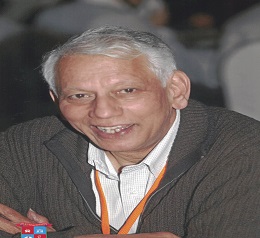Scholars International Webinar on
Cancer Research and Therapeutics
THEME: "Current Perspectives and New Challenges in Cancer Research and Therapy"
 23-24 Nov 2021
23-24 Nov 2021  ONLINE & VIRTUAL
ONLINE & VIRTUAL THEME: "Current Perspectives and New Challenges in Cancer Research and Therapy"
 23-24 Nov 2021
23-24 Nov 2021  ONLINE & VIRTUAL
ONLINE & VIRTUAL 
Palindrome Liaisons Consultants, USA
Title: Natural products as testable alternatives for therapy-resistant breast cancer
Nitin TELANG, Ph.D. (1974), obtained post-doctoral training in USA (1976-1985). He held faculty positions at Memorial Sloan-Kettering Cancer Center, Weill-Cornell Medical College and Strang Cancer Prevention Center, New York (1986-2007). Currently, he directs research for the Cancer Prevention Research Program at Palindrome Liaisons Consultants, New Jersey. Dr. TELANG’s research has been funded by the US National Cancer Institute and US Department of Defense. His publication record includes more than 100 peer-reviewed papers, and he serves on the editorial boards of several high impact journals. Dr. TELANG’s current research is in areas of preclinical oncology, cancer stem cell biology, and anti-cancer lead compound efficacy.
Study Rationale: Advanced breast cancer with distant metastasis represents a leading cause of mortality in women. Chemo-endocrine therapy and pathway selective targeted therapy exhibit systemic toxicity, tumor resistance and drug-resistant stem cell population, promoting disease progression. These limitations emphasize an unmet need efficacious nontoxic natural products as testable alternatives for therapy-resistant breast cancer. This review summarizes data on i) Development of models for clinical breast cancer, ii) Inhibitory efficacy of natural products on the developed models, iii) Development of drug-resistant stem cell models and iv) Mechanistic leads for efficacy of natural products on the stem cell population.
Experimental Design: Models for aromatase expressing Luminal A, HER-2-enriched, and triple-negative breast cancer subtypes represent the experimental systems. Dietary phytochemicals and nutritional herbs represent the test agents. Cell cycle progression, cellular apoptosis, status of relevant regulatory proteins and status of stem cell markers represent the quantitative end points.
Study Outcome: Relative to the non-tumorigenic cells, the tumorigenic cells exhibit loss of homeostatic growth control (accelerated cell cycle progression, downregulated cellular apoptosis) and persistent cancer risk (anchorage independent growth). Natural products at their respective maximum cytostatic concentrations inhibit cell cycle progression, induce cellular apoptosis and modulate the expressions of select regulatory proteins. Drug-resistant cells derived from the tumorigenic cell lines exhibit increased expression of stem cell specific cellular and molecular markers that are modified by natural products.
Study Conclusions: The present review of mechanistic evidence validates an experimental approach to identify and prioritize efficacious natural products as testable natural lead compounds for therapy resistant breast cancer.